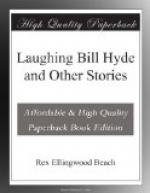“My fault, as usual,” Francis sneered. “Understand this, Phillips, my reputation means something to me, and I won’t be forced out of a good engagement by a—well, by you or by any other stage manager.”
Phillips saw that same fearful look leap into the woman’s eyes, and it checked his heated retort. “I don’t mean to find fault with you,” he declared, evenly. “I have the greatest respect for your ability as an actor, but—”
The star tossed his massive head in a peculiarly aggravating manner. “Perhaps you think you can play the part better than I?”
“Irving! Please!” breathed his wife.
“Show me how it should be done, if you feel it so strongly.”
“Thank you, I will,” Phillips answered, impulsively. “I’m not an actor, but I wrote this piece. What’s more, I lived it before I wrote it. It’s my own story, and I think I know how it should be played.”
Francis smiled mockingly. “Good!” said he; “I shall learn something.”
“Do you mind?” The author turned to the real Diane, and she shook her head, saying, uncertainly:
“It’s—very good of you.”
“Very well. If you will hold the manuscript, Mr. Francis, I’ll try to show what I feel the scene lacks. However, I don’t think I’ll need any prompting. Now, then, we’ll begin at John Danton’s entrance.”
With the mocking smile still upon his lips, Francis took the manuscript and seated himself upon the prompter’s table.
It was by no means remarkable that Henry Phillips should know something about acting, for he had long been a stage manager, and in emergencies he has assumed a good many divergent roles. He felt no self-consciousness, therefore, as he exchanged places with Francis; only an intense desire to prove his contentions. He nerved himself to an unusual effort, but before he had played more than a few moments he forgot the hostile husband and began to live the part of John Danton as he had lived it in the writing, as he invariably lived it every time he read the play or saw it acted.
Nor, as he had said, did he need prompting, for the lines were not the written speeches of another which had been impressed upon his brain by the mechanical process of repetition; they were his own thoughts expressed in the simplest terms he knew, and they came forth unbidden, hot, eager. Once he began to voice them he was seized by that same mighty current which had drawn them from him in the first place and left them strewn upon paper like driftwood after a flood. He had acted every part of his play; he had spoken every line many times in solitude; but this was the first time he had faced the real Diane. He found himself mastered by a fierce exultation; he forgot that he was acting or that the woman opposite him was playing a role of his creation; he began to live his true life for the first time since he had met the wife of Irving Francis. Clothed in the make-believe, the real Henry Phillips spoke freely, feelingly. His very voice changed in timbre, in quality; it became rich, alive; his eyes caressed the woman and stirred her to a new response.




